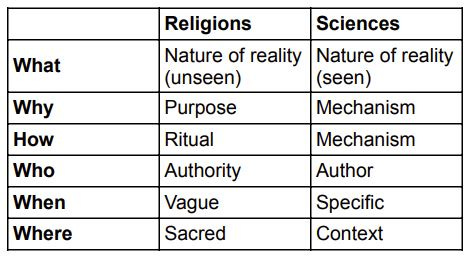The Algorithm dropped this YouTube video on me last week.
It is titled “How Science Proves God” and consists of two people with no scientific training opining on science. It has over 180,000 views. And it contains many arguments that are common among the Christian Apologetics community and are also hot garbage. However it has prompted me to consider the questions that scientists vs religious believers find important.
I am not going to debunk this video. I will simply say that:
John Bergsma gets the double slit experiment right.
Any discussions around the origins of life on earth are highly speculative.
Most of the positions that Bergsma takes are way outside the scientific mainstream and should be flagged as such.
In my experience, there is no persecution of Christians in the scientific community. Many of the most competent scientists that I studied with at university were Christians and went on to have solid scientific careers. Yes, if you are a young earth creationist, you may struggle to get a qualification in paleontology.
Sciences neither proves nor disproves the existence of a deity. But some widely accepted scientific theories do contradict some religious narratives about the world.
Anyway, I’m going to move on before I lose my temper. I want to think about questions.
Lets start with what. What is the quintessential question that everyone asks:
What is nature of reality?
What is that thing over there?
What’s going to happen next?
Typically the what questions that science and religion tackle are different but occasionally they overlap and such overlaps get messy.
Then we move onto why questions. Now religions tend to love why questions. One of reasons that religions exist is to provide answers to why questions.
Why do we exist?
Why are our lives like this?
Why do we suffer?
Science is less interested in why questions. The ultimate reasons why we have protons, electrons, sodium compounds, giraffes, etc are rarely of interest to scientists.
Science is much more interested in how questions. The mechanisms, mechanics, and processes of reality are the bread and butter of scientific research. Religions are much less interested in how questions. How did God create the universe in the first Chapter of Genesis? - Most Christians are not interested in that question. Incidentally Christian Apologists are typically weak on the hows of things. John Bergsma can’t tell us how God created all the species of the Cambrian Explosion - because he’s ultimately not interested in the answer. He just wants to dunk on the science.
Religion is interested in who questions - particularly:
Who is a member of our faith community and who is not?
Who has the authority to decide what we should believe and say and do?
Science is much less interested in who. Science prizes objectivity and empiricism - which seeks to remove the who of authority. It should not matter who conducts a piece of research to your acceptance of it. Now in practice it may do (science is a human endeavour and reputation matters) - but it shouldn’t.
Religion is often vague on when questions. The world was created a long time ago. When matters for science. The order in which things happen and the time they take is crucial for certain disciplines. The development of science is built on the accurate measurement of when. Religion only cares about when with rituals. Although one can lead to another. Accurate clocks were important in monasteries for the correct time to pray - these could then be used by natural philosophers for their own ends.
Finally, religion and science both care about where but in different ways. Religions care about particular sacred spaces (e.g. Temple Mount, Olympus, Mecca) and religions often started off geographically bounded to those spaces. Science also cares about where in two ways. Firstly the dream of the sciences is to transcend place- our fundamental laws of nature should be the same everywhere. Of course, they are not (Newtonian mechanics breaks down at small distances and high speeds). So where does matter. Where might even mean that you need to change your scientific discipline (e.g. cosmology vs oceanography).



